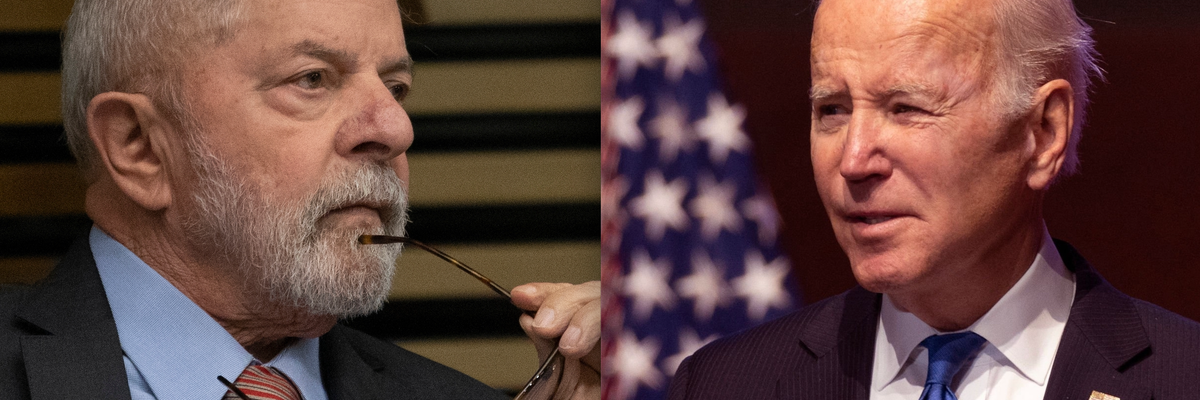On Friday, President Luiz Inácio Lula da Silva of Brazil will visit the White House for a meeting with President Joe Biden. This will be Lula’s first trip to the northern hemisphere since taking office for an unprecedented third term on January 1.
Tellingly, his first international trip was to neighboring Argentina for the Community of Latin American and Caribbean States, or CELAC, summit. Founded in 2010 as a counterpoint to the U.S.-dominated Organization of American States, CELAC is composed of 33 countries — including Venezuela and Cuba. After rejoining the body following Brazil’s withdrawal under his predecessor, Lula took the opportunity to reiterate his country’s support for a policy of non-intervention in the region.
“In the same way that I am against territorial occupation, as Russia did to Ukraine,” Lula said in his address, “I am against much interference in the process of Venezuela.” Brazil’s return to CELAC marked the country’s renewed commitment to regional integration efforts, which Lula sees as key to his country’s interests and the region’s shared prosperity.
Ahead of his U.S. trip, Lula has indicated that he wants to discuss the state of democracy around the world as well as more targeted issues like combatting climate change and increasing trade. Both leaders are also likely to look ahead to 2024, the bicentennial of U.S. recognition of Brazilian independence.
Perhaps more than anything, the meeting between Biden and Lula will be about both leaders getting a sense of each other. Both are warm, gregarious long-time politicians whose rhetoric is often laden with emotional appeals. How their personal relationship will translate in policy terms is a major development to watch as Biden begins the penultimate year of his administration and Lula his first.
Although there had initially been an expectation that Lula’s visit might last a few days, meeting with civil society representatives and business leaders, it now appears the trip will be remarkably short. He is scheduled to meet with sympathetic members of Congress and address the AFL-CIO before heading to the White House, but he will return to Brazil less than 48 hours after arriving. The reason for the hurry is not entirely clear. On one hand, this is a moment of good will between the United States and Brazil. The Biden administration, after all, was quick to recognize Lula’s victory over Bolsonaro and went to considerable lengths to dissuade Lula’s predecessor from attempting to interfere with Brazil’s democratic processes.
On the other hand, there are perhaps lingering hard feelings and suspicion among many on the Brazilian left regarding Washington’s role in Brazilian politics since 2016. Lula and those close to him have accused the United States of assisting in the process that culminated in his arrest five years ago. It bears remembering as well that the U.S. National Security Agency spied on Lula’s successor, Dilma Rousseff, during the Obama administration. Lula’s current foreign minister, Mauro Vieira, held the same post under Rousseff on her first visit to Washington following that diplomatic incident. It is unclear the extent to which these recent historical episodes contributed to the decision to keep Lula’s U.S. visit short, but they will certainly be on the minds of the Brazilian delegation.
Keeping that history in mind — in addition to the longer Cold War legacy of U.S. support for a coup against Brazil’s democratic president in 1964 — can help ensure a productive working relationship between Biden and Lula. Both have faced a dogged opposition stoked by the man they defeated in their respective elections. Among the usual shared priorities like trade and immigration, the defense of democracy itself has emerged as an area of mutual concern. Yet Brazil can and will compartmentalize its foreign policy priorities. It will not seek uniform alignment with the United States nor its rivals.
Indeed, perhaps the most important thing for members of the Biden administration to keep in mind is the fact that Brazil approaches global challenges in this perilous moment of war in Europe, potential spike in tensions between the United States and China, and Iran’s nuclear ambitions — among other sources of transnational concern — from its own distinct vantage point.
Lula’s calculations on the situations in Venezuela, Nicaragua, and Cuba, for example, are different from Biden’s. Some have criticized Lula for a failure to more directly criticize anti-democratic governments in his own region and beyond. But asking whether Lula has spoken out loudly enough on such matters misses the point. The more relevant question is whether such denouncements accomplish anything. Leaders like Nicolás Maduro in Venezuela, Daniel Ortega in Nicaragua, and Vladimir Putin in Russia are isolated on the world stage. What would Lula accomplish by attacking them? What end goal would that advance? The answer is unclear.
Whether or not one agrees with it, Lula’s foreign policy approach is nothing if not rational: as much as possible, keep Brazil out of conflicts that don’t directly affect its immediate interests, thus preserving credibility and goodwill to act as mediator down the line. Rather than fretting over Brazil’s allegiances, the Biden administration should recognize the country’s current orientation as a legitimate strategy rooted in a history of non-alignment.
Instead of pressuring Lula to adhere to Biden’s favored policies, the United States should recognize Brazil’s potential to help resolve some of the intractable global issues that Washington can’t address on its own. After all, Brazil has made clear that it will not let superpower competition dictate its foreign policy.
















